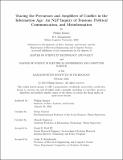Tracing the Precursors and Amplifiers of Conflict in the Information Age: An NLP Inquiry of Tensions, Political Communication, and Misinformation
Author(s)
Zimmer, Philipp
DownloadThesis PDF (9.712Mb)
Advisor
Christia, Fotini
Raghavan, Manish
Terms of use
Metadata
Show full item recordAbstract
Violent conflicts, in their varied and complex forms, have long been a subject of research and political discourse. Despite increased attention for the field, various nuances and dynamics are yet to be explored. This thesis seeks to study three aspects of the multifaceted nature of conflicts through the lens of natural language processing (NLP), thereby not only offering new insights but also advancing the field's methodological landscape.
First, the study delves into the identification of causal predictors of conflicts. By showcasing the potential of a frame-semantic parser, I am able to quantify the precursors that contribute to conflict and examine the potential for enhancing prediction models with greater qualitative depth. This chapter utilizes a rich but under-examined data source, news articles, which can aid closing the data gap in conflict studies.
In the second chapter, the communication strategies of political leaders during crises are scrutinized to understand the rationale behind their messaging and the impact thereof. I argue that leaders' engagement frequency and style with their citizens is dependent on the political systems' characteristics and that it matters for societal conceptions.
The final chapter addresses the spread of misinformation, such as in times of crisis, investigating which themes are prone to the widespread propagation on social media and presenting a novel ensemble method for the detection of misleading and false content.
By integrating computational techniques with political theory, this work contributes to a nuanced understanding of conflict dynamics and offers rich potential for anticipatory actions of policymakers.
Date issued
2024-02Department
Massachusetts Institute of Technology. Department of Electrical Engineering and Computer Science; Massachusetts Institute of Technology. Institute for Data, Systems, and SocietyPublisher
Massachusetts Institute of Technology